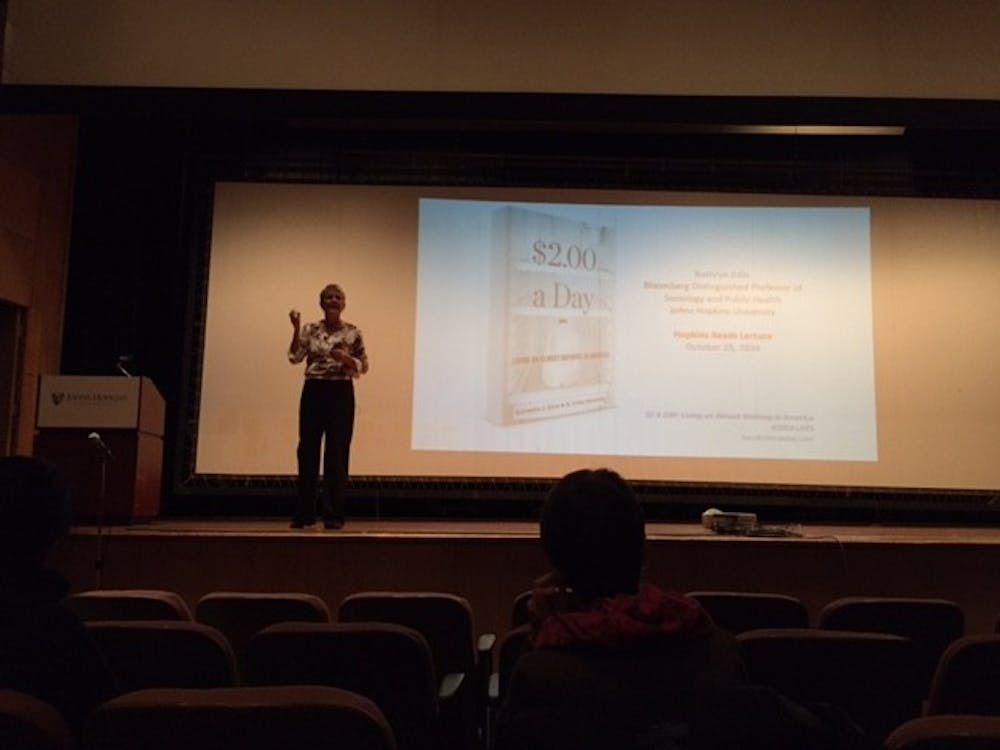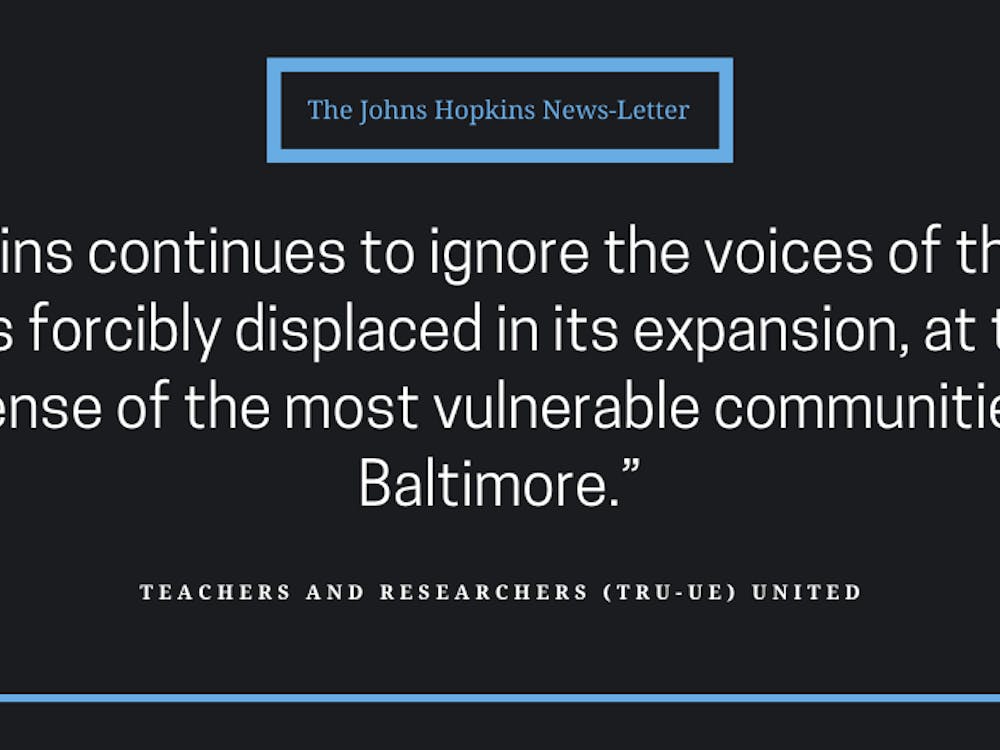Kathryn J. Edin, a Bloomberg Distinguished Professor of sociology and public health, held a keynote presentation in the Shriver Hall this Tuesday that centered around her book $2.00 a Day: Living on Almost Nothing in America.
$2.00 a Day, cowritten with H. Luke Shaefer, explores deep poverty in the United States and was the common read for the Class of 2020 prior to their arrival on campus.
Edin retold the stories of the poor Americans and their families that she had interviewed for her book to highlight the consequences of sustained cuts to the country’s social safety net.
She began the presentation by explaining what inspired her to start the project.
“Intellectual life is all about ideas,” she said. “And you never know when you’re going to have an epiphany. For me, the epiphany that started $2.00 a Day happened on Monument Street.”
The scene, according to Edin, took place at a public housing project called Latrobe Home. There, Edin met Ashley, the 19-year-old mother of a two-week-old baby, whom Edin was interviewing for a study on low-income families and children transitioning into adulthood.
Edin recalled the meeting in detail for her audience.
“The first thing I noticed is that Ashley, 19-year-old mother of a two week old, is visibly unkempt,” Edin said. “She is having a hard time making eye contact with me. She’s passing her baby from shoulder to shoulder. And as she’s doing that she’s not doing the critical things that mothers and fathers do with their infants.”
She told audience members how Ashley neglected to place her hand behind the child’s head, which she described as flopping around. This, to Edin, was a sign that something was clearly wrong.
“I go into the apartment, and the first thing I noticed was that there is virtually no furniture,” she said. “There’s a trash-picked couch, there’s a single mattress with a fitted torn filthy Bugs Bunny sheet. There’s a table in the kitchen with only three legs so it’s useless, pushed up against the wall. There is just one chair and so Ashley sits on the chair with her baby. I sit on the floor and it just so happens that my perch on the floor gets me a view into her cabinets. Like lots of housing projects, the cabinets had no doors.”
Edin then realized that the family had no food in their cupboards or in the refrigerator, let alone any baby formula. Concerned about the welfare of Ashley and her child, Edin returned to interview her a second time. She gave Ashley $50 as compensation for the interview and came back the next day to experience what she called her second epiphany.
“Ashley greeted us at the door transformed,” Dr. Edin said. “There’s a little convenience store behind Latrobe home — she had gone there and she’d gotten a home perm. She looked great. She’d walked down Broadway avenue and she’d gotten a pantsuit. She was wearing the pantsuit. She had passed the baby off to her mother to care for the child and she, literally with a spring in her step, was on her way to look for a job. $50.”
Edin then explained what changed.
“A second thought occurred to me: In the world’s most advanced capitalist society where we don’t have a barter system like they do in much of the developing world, was there something essential about cash that you couldn’t buy with a Medicaid card? That made a difference between a woman who is too despondent to support her baby’s head properly and someone who is ready to go out and search for a job.”
She presented charts to illustrate what she identified as a serious lack of attention and provisions for those most in need.
“We actually spend more as a nation on anti-poverty programs than we used to,” Edin said. “But I also knew from the research that more of that money went to the second fifth of the income distribution: the near poor. And it was being redistributed upwards by changes in social policy.”
Edin further argued that America’s welfare system, which has always undergone widespread criticism, is dead. According to her book, this was an unintended consequence of welfare reform during Bill Clinton’s presidency.
“It used to be that we served about five million adults and their dependent children in 1994, when the welfare system was at its height. About 80 percent of poor families and children were touched by the welfare program, were aided by the welfare program,” Edin said. “That amount has gone down today to just above 20 percent. And only one million adults remain on the rolls. One million. Actually this slide is out of date: The most recent government statistics show that the numbers are about 850,000. Half of those are just two states, California and New York.”
Freshman Nancy Wang found the keynote a useful addition to the book, which she thought was an eye-opening experience.
“Coming into Hopkins reading the book, I’d already followed the presidential elections, so I knew that income inequality was becoming a growing issue,” Wang said. “After having this talk about things we can do specifically to help the $2 a day poor and having Baltimore as... I wouldn’t say it is an example, but it’s a good place where you can start that change. It was very empowering and insightful that we had this conversation.”
Freshman Polly Berman felt that much of the keynote’s appeal was due to Edin’s many in-depth stories on several poor individuals and was impressed by the rapport she maintained with them.
“She keeps up with three interviewees specifically and one of them sends her Bible verses everyday,” Berman said. “First of all I thought, ‘How does he do it? By mail? Where does he get the money by mail? Or by email? Does he even have access to a computer?’”
Berman felt that the presentation inspired them to help facilitate social change for the needy.
“I just really enjoyed listening to how these [interviewees] are getting paid very little but they’re still eager to share their stories,” Berman said. “Not for the money, but because they care more than us, and if they can care so much about this and be in this situation they’re in and be this willing to share their story with such little reward, why can’t we do that too? Why can’t we invest in their story and work for it? I just feel like we can learn from them and actually care from the bottom of our hearts and learn more and try to help them just like they’re trying to help us better understand what they’re going through.”
To conclude, Edin read aloud a blog by one of her former students at the Harvard Kennedy School to provide an example of how students can help.
“It suffices to say that I completely lost it in my hotel room,” Edin said. “And I want to share it with you because I think it speaks to what you can do as an individual.”
This former student was a great admirer of Mr. Patten, a teacher in the book who helped a girl named Tabitha escape her troubling home life in an extremely poor community and get an education. The student later discovered that Mr. Patten was not a teacher at all, but one of her friends.
“Go close the many gaps in our society,” Edin concluded. “Whether [it is] the achievement gap or the gap in the social safety net. But we also need to close the gap on social distance.”























Please note All comments are eligible for publication in The News-Letter.